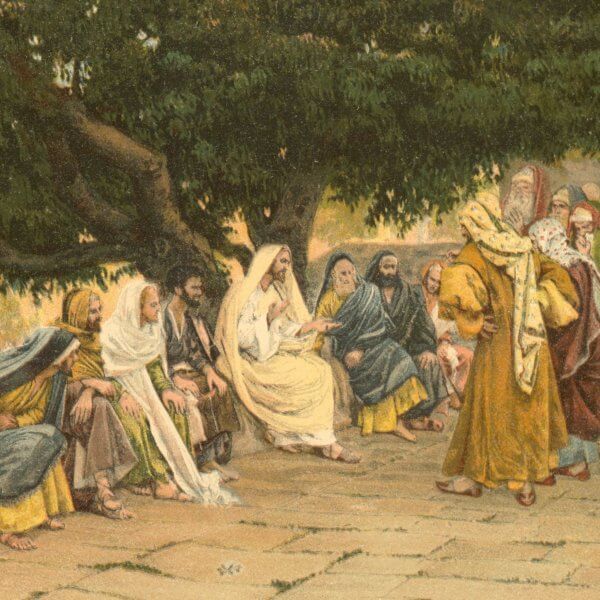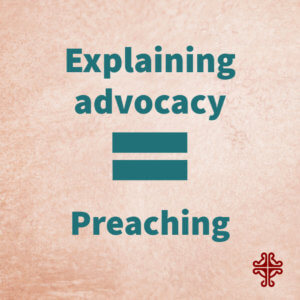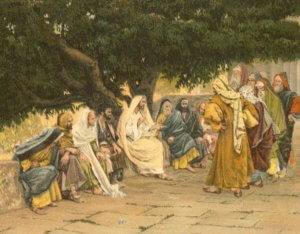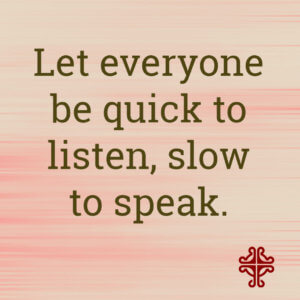
Preaching God’s Law
Lawyers are more like preachers than most people see. A lawyer’s task is to know the law, to understand how it applies to a given situation, and to communicate how all that works — persuasively — to those involved. A preacher’s work is to know scripture — the ancient story of humanity’s experiences with God — to discern how it applies to our lives today, and to communicate how all that works — compellingly — to those who hear.
 In the law, we call this explaining advocacy, which is equal measures of knowledge and persuasion. In church, we call this same activity of explaining preaching. There were certainly times during my long law practice when the close association of the roles of advocate and preacher merged. And while I relished this advocacy role, if I’m really being candid with myself, it’s also really likely that it was the preacher in me breaking through my law clothes. I’m thinking of this interestingly blurry line today because our readings are all focused on the law.
In the law, we call this explaining advocacy, which is equal measures of knowledge and persuasion. In church, we call this same activity of explaining preaching. There were certainly times during my long law practice when the close association of the roles of advocate and preacher merged. And while I relished this advocacy role, if I’m really being candid with myself, it’s also really likely that it was the preacher in me breaking through my law clothes. I’m thinking of this interestingly blurry line today because our readings are all focused on the law.
Don’t Get Creative
In Deuteronomy, as we heard this morning, Moses has just laid out God’s laws the Israelites must follow to get into the Promised Land. Moses adds this final instruction:
You must neither add anything to what I command you nor take away anything from it, but keep the commandments of the Lord your God with which I am charging you.
In other words, don’t get creative. Remember that God is God and you are not. Regulation of human society is on a different order of importance than the commandments of God that Moses is giving to the people.
The letter from James offers what lawyers would call a rule of interpretation:
You must understand this, my beloved: let everyone be quick to listen,
slow to speak, AND slow to anger; for your anger does not produce God’s
righteousness.
In other words, live out and apply ALL of God’s laws with a loving and listening heart — without anger and self-righteousness. Don’t leave any part out, and don’t add any human customs or traditions. And then we get to Mark’s gospel, where our passage today acts out its conflict with both God’s law and the rule of loving interpretation.
Immediately
First, some context on Mark. Mark’s gospel is almost undoubtedly the first of the four gospels to be written down from the oral tradition of stories about Jesus. Mark’s gospel is short — just 16 chapters in all. Everything happens immediately in Mark’s gospel, racing forward at breakneck speed. And Mark’s gospel also uses the Greek word euthus, which means immediately, 41 times, emphasizing its urgency each time it’s repeated.
 So with that urgent pace and really short gospel in mind for context, how do we understand our gospel from Mark today? The Pharisees were the learned sect of Jews, who specialized in the law. There are scholars who believe that Jesus may have been trained as a Pharisee because of his great knowledge of the law, even though he often condemns their tight focus on the law rather than God. These learned, law-loving Jews — the Pharisees — and the scribes — the people with skills to take notes and write things down — came to see Jesus from Jerusalem. Jerusalem is where the Temple was, and where all the learned Jews who knew the law gathered.
So with that urgent pace and really short gospel in mind for context, how do we understand our gospel from Mark today? The Pharisees were the learned sect of Jews, who specialized in the law. There are scholars who believe that Jesus may have been trained as a Pharisee because of his great knowledge of the law, even though he often condemns their tight focus on the law rather than God. These learned, law-loving Jews — the Pharisees — and the scribes — the people with skills to take notes and write things down — came to see Jesus from Jerusalem. Jerusalem is where the Temple was, and where all the learned Jews who knew the law gathered.
They notice that some of Jesus’ disciples didn’t wash their hands before dinner. So they ask Jesus about it, and it’s not just a question asked off-screen — out of our sight. Mark’s gospel, as brief and urgent as it is, not only quotes the question, but also goes into a detailed description of the “traditions of Jewish elders”:
For the Pharisees, and all the Jews, do not eat unless they thoroughly wash their hands, thus observing the tradition of the elders; and they do not eat anything from the market unless they wash it; and there are also many other traditions that they observe, the washing of cups, pots, and bronze kettles.)
And then Jesus dresses down the Pharisees on the point for all of us to hear and see, even quoting Isaiah — remember Jesus is a good Jew who knows his Torah.
Does Jesus think that the Pharisees’ question is the right area of concern to focus on? Human traditions on hand hygiene and cooking prep? Does Mark, writing it all down for us to read later in Mark’s gospel? Washing your hands before dinner, keeping the pots and pans clean, and washing the fruit and vegetables before cooking seem like reasonable kitchen hygiene practices. But this level of trivial detail — especially in Mark’s short, fast-paced gospel — is shouting for our attention. It’s our clue that these “traditions of the elders” are not key to God’s law. Also, the question these scholars, who were expert in the law, sound more like their making an accusation — playing gotcha, rather than asking for information or clarification.
Let God Be God
What happens when we apply God’s law to our context today, as we work out the details of worshiping through the pandemic, grow and develop the leadership on our vestry, discover and use the resources of our community, care for our aging building, stay in relationship with the Diocese, form our new relationship with the Newport Music Festival? I hear freedom in Jesus’ message. It sounds stern, because he’s really frustrated with the Pharisees’ game of gotcha, but I think he’s telling us it’s all going to be OK. Watch out for the big stuff in God’s law — fornication, theft, murder, adultery, avarice, wickedness, deceit, licentiousness, envy, slander, pride and folly — but outside the biggies, we’re talking about human traditions and customs. Let God be God, and make sure we pay attention to that. But don’t get all bound up in imagining our traditions — even our treasured religious traditions — are God’s law.
Like liturgical colors — I’m wearing green today because it’s the 17th Sunday after Pentecost — Ordinary Time. I love wearing green to remind myself it’s Ordinary Time, and we’re moving steadily toward Advent — that season of hushed expectation where we wait for Jesus’ birth. (And that also is opening of camel for me, as you know — remember the long journey of the magi, and who else but camels could have guided their star path?) But “clergy and altar must be dressed in green at Ordinary Time is NOT the Word of the Lord.” It’s a good and reasonable prompt for our faith, but it’s not on the list of the biggies God’s given us. Jesus is telling us to chill. Let God be God.
 This is a difficult message to understand and hard to hear — possibly because Jesus may be yelling in this scene. And I know I don’t hear well when I forget the rules of interpretation: let everyone be quick to listen, slow to speak, AND slow to anger; for your anger does not produce God’s righteousness. But Jesus is telling us all will be well if we just calm down and let God be God and don’t try to take over God’s job. We are free to improvise in useful human traditions as long as we leave God in charge of God’s law.
This is a difficult message to understand and hard to hear — possibly because Jesus may be yelling in this scene. And I know I don’t hear well when I forget the rules of interpretation: let everyone be quick to listen, slow to speak, AND slow to anger; for your anger does not produce God’s righteousness. But Jesus is telling us all will be well if we just calm down and let God be God and don’t try to take over God’s job. We are free to improvise in useful human traditions as long as we leave God in charge of God’s law.
If we have to make some adjustments to our traditions, we’ll all be just fine. Whether it’s distributing only bread at communion, having meetings by Zoom, distanced Coffee Hours, or finding new ways of doing the things that make our community Emmanuel. We just need to remember God’s law, not adding any new parts or leave anything out, and apply God’s law with love — listening more, talking less, and not taking ourselves too seriously. Amen
